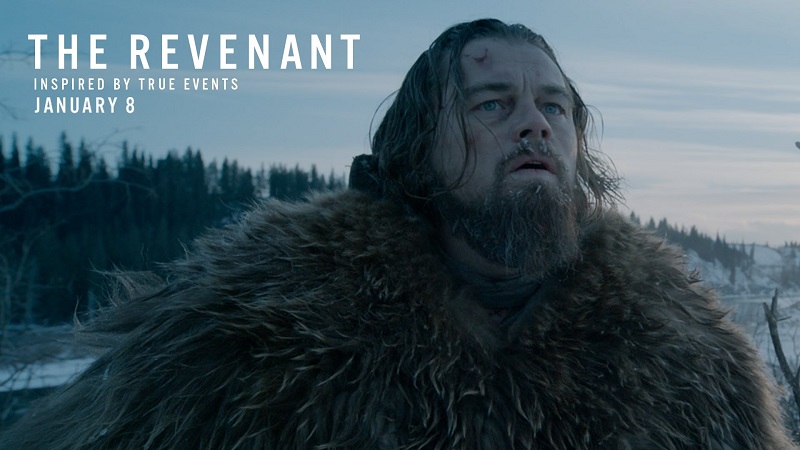When a movie has been nominated for 12 Oscars, 8 Baftas, and already won 3 Golden Globes, it’s hard not to view it with a certain level of expectation. Alejandro G. Iñárritu’s 6th directorial feature film is an odyssey of survival, gruelling endurance, and breath-taking sensory and marvel aesthetic. Set in 19th Century Louisiana Purchase, it tells the story of frontiersman Hugh Glass (DiCaprio), and his arduous pilgrimage from the brink of death, fuelled only by his desire for vengeance.
Whilst collecting his Golden Globe for Best Director, Iñárritu proclaimed that “Pain is temporary, but a film is forever”, and cast and crew alike certainly suffered in the name of art during the making of The Revenant. Several rumours emerged of cast rifts, Iñárritu’s insistence on shooting only in natural light meaning that the entire crew would be dragged from Canada to Argentina for 90 minutes of filming. The director’s demand for perfection continually rendered the production evermore behind schedule and beyond budget. DiCaprio perhaps had the most uncomfortable experience of all, having spent the night sleeping in an animal carcass and chowing down on raw bison liver. The notion of cinema as a pitiless and brutal endurance test has been fully embraced by Iñárritu. Yet he pushes himself, his cast, and his audience well beyond their usual limits, to remarkable effect.
The opening sequence depicts Glass and his fellow frontiersman, collecting furs and pelts for the Rocky Mountain Fur Company, as they come under attack by native Arikara. Glass is travelling with his teenage son, Hawk (Forrest Goodluck), a descendant of the Pawnee tribe on his mother’s side. As the surviving frontiersmen try and navigate their way through enemy territory, Glass becomes separated, and so ensues the scene that will undoubtedly stay in the mind of all those who watch The Revenant for years to come. A savage five-minute bear attack that is visceral, graphic, and brutal leaves Glass as a mauled shell of a man, on the very brink of death, unable to speak or move.
Glass, considered a lost cause, is abandoned by his fellow fur trappers, left in the company of his son, Tom Hardy’s John Fitzgerald and Will Poulter’s Jim Bridger, who agree to wait behind in order to give Glass a dignified burial. Fitzgerald, eager to avoid a confrontation with the Arikara, murders Hawk, and leaves Glass for dead. From here on out, we see Glass, hell-bent on revenge, tackle hellish terrain and evade vengeful natives and merciless soldiers on his way.
The plot may seem like a simple revenge story, but thematically there is much more to The Revenant than just that. It’s a reflection on the complex relationship between modern man and nature, and the primal savagery of man against man. The film is imbibed with religious symbolism, and offers comment on spiritual issues such as revenge and rebirth, morality and the importance of familial bonds. Cinematographer Emmanuel Lubezki’s work is stunning throughout, and aesthetically we’re transported to a mythical and unforgiving land, the viewer is plunged into an enervating hell that often looks like heaven. Ryuichi Sakamoto’s soundtrack is a hauntingly beautiful accompaniment to the imperious cinematography.
DiCaprio gives a truly accomplished portrayal as Glass, and given his exceptionally limited script it’s remarkable that as an audience we remain so invested in his character. Domhnall Gleeson is perfect as the rule-abiding and strait-laced Andrew Henry, and Will Poulter is particularly memorable as the young and naïve Jim Bridger. However, Tom Hardy’s morally ambiguous and selfish John Fitzgerald steals the show as the most intriguing and multi-dimensional character. The weak-willed Fitzgerald epitomises materialistic modern man.
The Revenant is an endurance test. It’s gruelling, it’ll leave you feeling absolutely exhausted, and it’s certainly not for faint hearted. It does suffer from side plots that tend to distract the viewer from the key storyline, and perhaps audiences would be left feeling less drained if the action focused exclusively on Glass and Fitzgerald, without the added interactions between the French and the Pawnee. It is, however, a captivating watch that is magnificently crafted, completely unique, and creates a truly immersive experience. It’s hard to believe that it’s been 23 years since DiCaprio was given his first Oscar nomination for his role in What’s Eating Gilbert Grape. After watching The Revenant, I’m now firmly of the opinion that if this doesn’t win him an Oscar, then nothing will.



